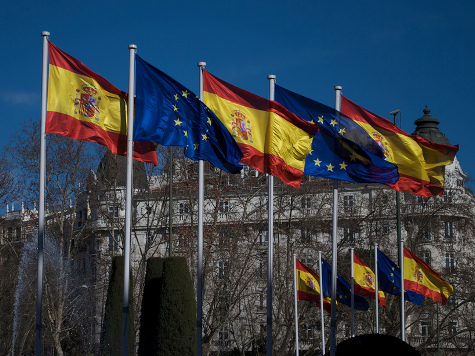In the run up to next month’s European Elections, many commentators have been focusing on the rise of Eurosceptic parties across the continent. Parties such as UKIP in Britain, the Front National in France, the Party for Freedom in the Netherlands and Alternative fur Deutschland in Germany all expect to increase their representation in the European Parliament.
Although they do not all share an identical platform, one thing they do have in common is that they are regarded as being “on the right”, either with a conservative free-market ideology or a more nationalist tone.
One notable exception to all of this is Spain. Despite a stagnant economy, high unemployment and widespread disillusionment with the country’s two main parties, there remains no significant right-wing populist party of any note in Spain.
Recent polls for the forthcoming European Elections in the country still put the two main parties – the conservative People’s Party (PP) and the Socialist Party – far ahead of all others, with the main challengers being the far-left United Left party, who score between 10 and 15 percent. There is a right-wing breakaway party from the PP called Vox, but they are struggling to score one or two percent.
One possible explanation is that the Spanish tend to be generally more pro-EU than other countries. Under the dictatorship of General Franco, Spain was isolated from the rest of Europe for much of the post-war period, blocked from being part of the nascent European Economic Community by the continent’s democratic nations.
After the dictator’s death in 1975 and the restoration of democracy, Spaniards were desperate to end their isolation and fully embraced European Community (later European Union) membership as symbolic of renewed prosperity and a restored democracy.
This is not to say, however, that Spain hasn’t suffered from the impact of the European economic downturn and been hurt by membership of the Eurozone. There is deep dissatisfaction with how both main parties have handled Spain’s economic crisis, which, at its worst, saw a quarter of young people out of work.
Disillusioned voters have flocked to the left, rather than the right, however. The United Left, a coalition that includes Spain’s Communist Party, has surged in national polls to the extent that they may be in a position to form a coalition with the Socialist Party after the next parliamentary elections.
Another factor in Spanish politics is the popularity of “regional nationalism”. Spain is already one of Europe’s most decentralised countries, and a number of its regions have nationalist movements of varying strength. In Catalonia, the economic crisis has been a gift for that region’s nationalists, with polls suggesting a majority of Catalans now favour independence from Spain. Similarly, the Basque Country has its own party system, dominated by two nationalist parties who serve as a lightning rod for disillusionment with the Madrid government.
In these two regions, at least, there is little need for a nationwide anti-establishment populist party.
The lack of centralisation also means that regional governments are stronger than in other EU nations, and thus there is less of a “political class” concentrated in the national capital against which a populist party could set itself.
Spain’s regions have a large level of autonomy compared to other countries, and many of those regions are themselves subdivided into provinces, which are then further subdivided into counties and then municipalities. With power spread over so many layers of government, it is more difficult to point to a homogenous “establishment”.
Ben Harris-Quinney, a writer on Spanish affairs, told Breitbart London: “Spain has suffered some of the same homogenisation of its politics as the UK has over the past 2 decades, but the wider national support for EU membership and greater regional autonomy has meant the pulbic reaction to third way politics hasn’t been as strong nationally.
“The Spanish conservative party, the Partido Popular, has moved to the centre in recent years, and two new conservative parties, Alternativa Espanola and VOX, have founded in light of that, but their popularity is modest.
“Spanish government is less centralised, and with a number of major cities the phenomenon of a disconnected “Westminster bubble” or “metropolitan elite” has not been as great.
What we have seen post – economic crisis is a huge rise in regional nationalist parties, often with radical socialist messages, that have courted any anti – establishment sentiment very succesfully.”

COMMENTS
Please let us know if you're having issues with commenting.